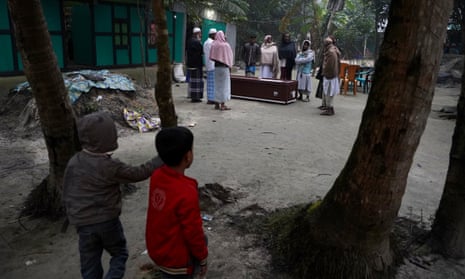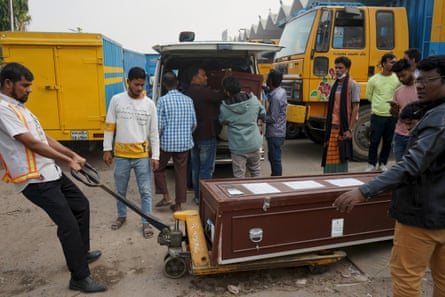‘Many migrant workers will die’: why awarding the 2034 World Cup to Saudi Arabia alarms rights groups
“Millions of migrants will build stadiums, transport networks and hotels. But testimonies from Bangladeshis who have worked there suggest abuse is deeply entrenched in the Gulf kingdom

When Shahadat set out for Saudi Arabia from his village in Bangladesh, he was driven by a single purpose: to earn money for his impoverished family. “If he sent money home, his family would eat. If he didn’t, they wouldn’t,” says a relative.
For years he just about scraped by, sending a little money home each month and trying to pay down the huge debt he took on to afford the illegal fees a recruitment agent had charged him to get to Saudi Arabia.
Then it all began to unravel. An employer failed to renew his residence permit, turning him into an undocumented worker. His health began to suffer, but his irregular status meant it would have been difficult to access medical care.
He struggled to find work. Instead of sending money home, he had to borrow more to survive. He was so desperate he took on jobs on construction sites in exchange for only food and board.
And then his journey came to a sudden end. “I phoned him one day and his roommate told me he was sleeping,” says Shahadat’s wife, Rojina. “When they tried to wake him up, they found he was dead.”
Shahadat’s death was one of a number of stories shared with the Guardian this year as we investigated the high number of unexplained deaths of Bangladeshi migrant workers in Saudi Arabia.

On average, four Bangladeshis died in the country every day in 2022. It is unclear whether that death rate is within the expected range given the number of Bangladeshis in Saudi Arabia – about 2 million – but its audacious plans for the World Cup in 2034 are likely to see a surge in demand for workers like Shahadat.
Over the past months, a host of human rights groups have raised concerns about the alleged abuse of migrant workers and the risks of awarding the World Cup to Saudi Arabia, with Amnesty International saying, “migrant workers will face exploitation, and many will die”.
The existing death toll was laid bare at Dhaka’s international airport late last year, where distraught and confused families came to collect the coffins carrying the bodies of their loved ones as they were trundled out on trolleys from the cargo depot.
Shahadat’s coffin was transported from the airport by ambulance to his village, about a three-hour drive from Dhaka. It was late at night when it arrived, but a crowd of more than 100 had stayed up to receive him. Every household in his village had sent someone abroad for work, and so the death of one weighed heavy on them all.
It is a scene repeated with gut-wrenching frequency in villages and towns across Bangladesh. At least 13,685 Bangladeshis died in Saudi Arabia between 2008 and 2022, according to Bangladeshi government records. The majority of deaths appear to be unexplained and unexamined, making it difficult to establish the underlying causes.

Experts have pointed to the harsh living and working conditions faced by many workers as likely contributory factors. “I think the mental pressure of not having the right documents, not having a job and dealing with his debts all played a part in his death,” says Rojina.
Saudi Arabia is a nation powered not just by oil, but by cheap labour. They come in their millions, from Bangladesh, India, Pakistan, Nepal and beyond. They will build the promised 11 new stadiums, transport networks and 185,000 hotel rooms. Without them there would be no World Cup.
Saudi Arabia’s human rights strategy, submitted as part of its bid for the World Cup, includes a long list of steps it says it will take to strengthen protections, including, “mandatory welfare standards”.
But testimonies from Bangladeshi workers who have returned home suggest abuse is deeply entrenched in the Gulf kingdom. At the arrivals gate at Dhaka’s airport late last year, men such as Abu Raihan emerged looking shell-shocked. He was one of almost 70,000 Bangladeshis deported from Saudi Arabia in 2022, largely for not having a valid residence permit.
They are rounded up on the streets and taken to detention centres, where they are typically held for one to two weeks before being sent home. They bring back tales of shocking treatment and abuse; false contracts, unpaid wages and massive recruitment debts.
Raihan says he had to sell his land to pay the 430,000 taka (£2,800) recruitment fee to secure his work visa in Saudi Arabia. He says he was promised a two-year contract, but after 90 days his company did not extend his visa.
With no work and no food, Raihan went to the police to complain, but instead of helping him, they took him to a detention centre, he alleges. “I became illegal because of my employer, but the police did not take any action against him.”
Saudi Arabia’s ministry of human resources and social development has said that, “robust regulations and standards to safeguard workers’ rights” are in place and that it “only repatriates those proven to have violated the work and residency regulations in the kingdom after taking all legal measures to verify their violations and coordinating with the embassies of their countries”.
No comments:
Post a Comment